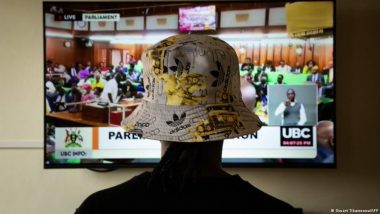Uganda's new and stricter laws to punish lesbian, gay, bisexual, transgender and queer people puts draconian restrictions on the media and advocates for LGBTQ rights too.Journalists in Uganda are wary over the new Anti-Homosexuality Bill that is making its way into law, providing for harsher punishment for the country's LGBTQ community.
Also Read | State Bank of Pakistan Likely To Raise Interest Rate To Unlock IMF Loan Programme.
It also includes restrictions on the media.
Also Read | How Digitalization Improves Remittances to Africa.
Journalists and publishers could face prosecution and imprisonment for publishing, broadcasting or distributing content deemed to advocate for the rights of LGBTQ people.
The provisions have sparked fear in media circles. "We have a problem," says Francis Ahabyona, a Kampala-based news editor.
"The Journalists' Act talks about balanced and fairness. We are supposed to be independent minded; we are supposed to be objective. When you begin to infringe on the rights and freedoms of a media person then you are denying information to the public," Ahabyona told DW.
LGBTQ rights advocacy outlawed
One news reporter who requested anonymity told DW she is puzzled by the inclusion of the media in the new legislation. Lawmakers should have consulted communications experts before proposing such clauses in the draft law, she says.
"If a journalist or a media house is being held accountable for exposing homosexuality, or a homosexual whom they are fighting, that means they are just hiding their heads in the sand. It cannot be both ways," she said.
"They would have requested us to support them, but it is like they are telling us to leave them, don't touch them," the Ugandan reporter added.
Individuals and institutions found to support or fund LGBTQ rights advocacy work, those who publish, broadcast or distribute literature deemed pro-LGBTQ could face prosecution and imprisonment.
The controversial bill also makes provision for a life sentence for anyone convicted of grooming or trafficking children for purposes of engaging them in "homosexual activities."
The bill proscribes the death penalty for the sexual abuse of a child, a person with a disability or a vulnerable person.
Rights groups decry the law
President Yoweri Museveni has 30 days to assent or reject the Anti-Homosexuality Bill, which received broad govenrment and public support.
The majoriy of lawmakers have hailed the Anti-Homosexuality Bill as comprehensive and argue that it is geared towards protecting traditional family values and Uganda's diverse culture.
Christian Rumu, an Amnesty International campaigner for the Great Lakes region, says the new legislation is not about values or culture.
"I think it is really the promotion of hatred and the promotion of intolerance rather than really the intention of curtailing the promotion of homosexuality," Rumu told DW.
"It has never been an issue, if you ask Ugandans on the streets. But at the end of the day, the consequences of this law is going to be promoting intolerance in the community and that would lead up to violence against an already marginalized community."
Fox Odoi, the lawmaker who read the minority view on the draft law, said many of the clauses already exist in law.
"The bill is a duplication of the provisions that already exist under the Penal Code Act and is therefore unnecessary," Odoi told DW.
Scathing international reaction
Human Rights Watch (HRW) has warned that the law will violate the rights under both Ugandan and international law on a number of levels including freedom of expression and association, privacy, and freedom from discrimination, inhuman and degrading treatment.
"[President] Museveni should reject the bill and parliament should introduce comprehensive non-discrimination legislation that would protect sexual and other minorities in line with Uganda's international obligations," HRW said.
Meanwhile the US has warned Uganda of possible economic "repercussions" if the new law comes into effect.
"We would have to take a look at whether or not there might be repercussions that we would have to take, perhaps in an economic way, should this law actually get passed and enacted," US National Security Council spokesman John Kirby said
The 27-member European Union has also expressed deep concern.
“The European Union will continue engaging with the Ugandan authorities and civil society to ensure that all individuals, regardless of their sexual orientation and gender identity, are treated equally, with dignity and respect," it said.
Edited by Benita van Eyssen
(The above story first appeared on LatestLY on Mar 23, 2023 10:00 PM IST. For more news and updates on politics, world, sports, entertainment and lifestyle, log on to our website latestly.com).













 Quickly
Quickly




















